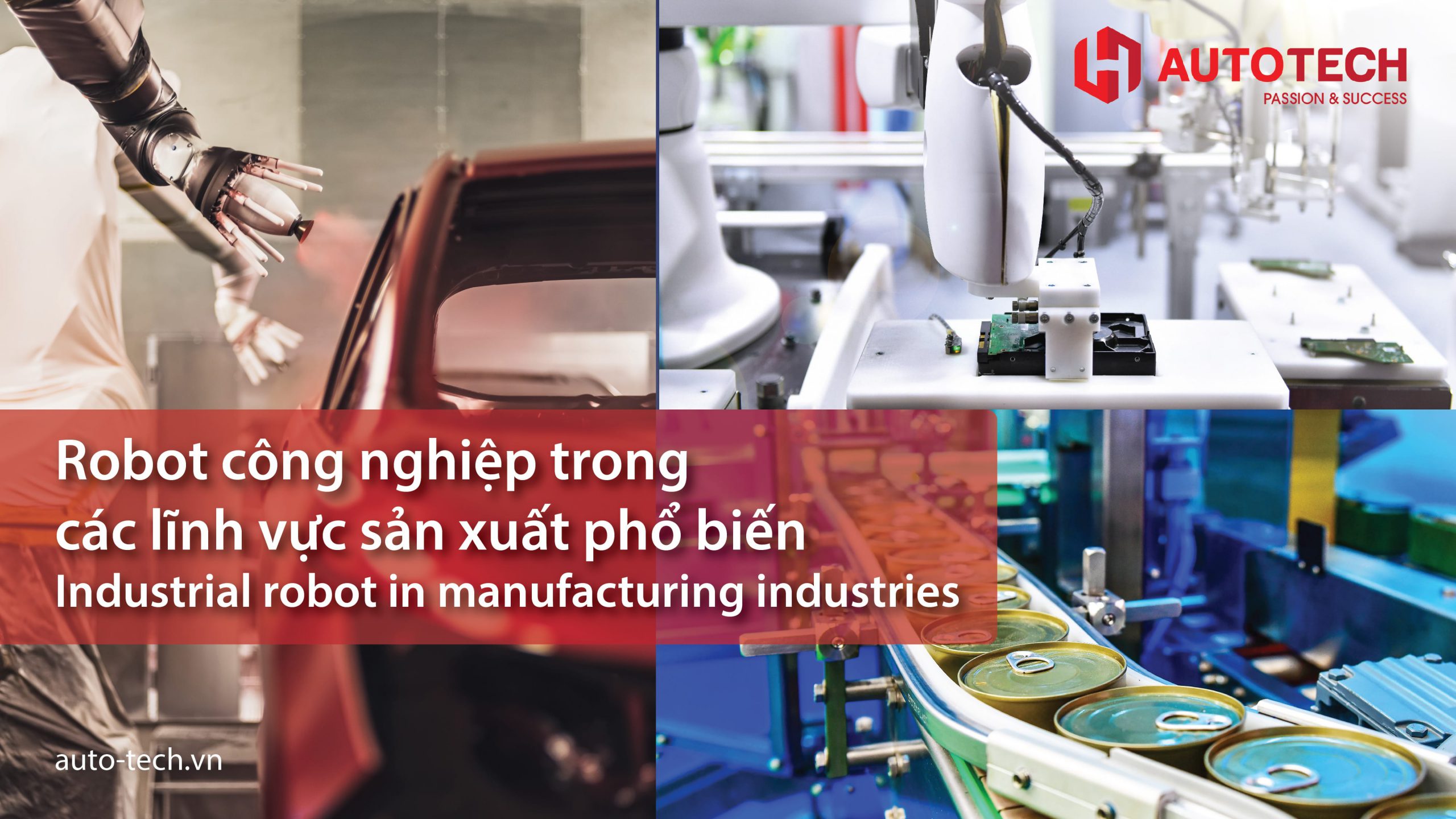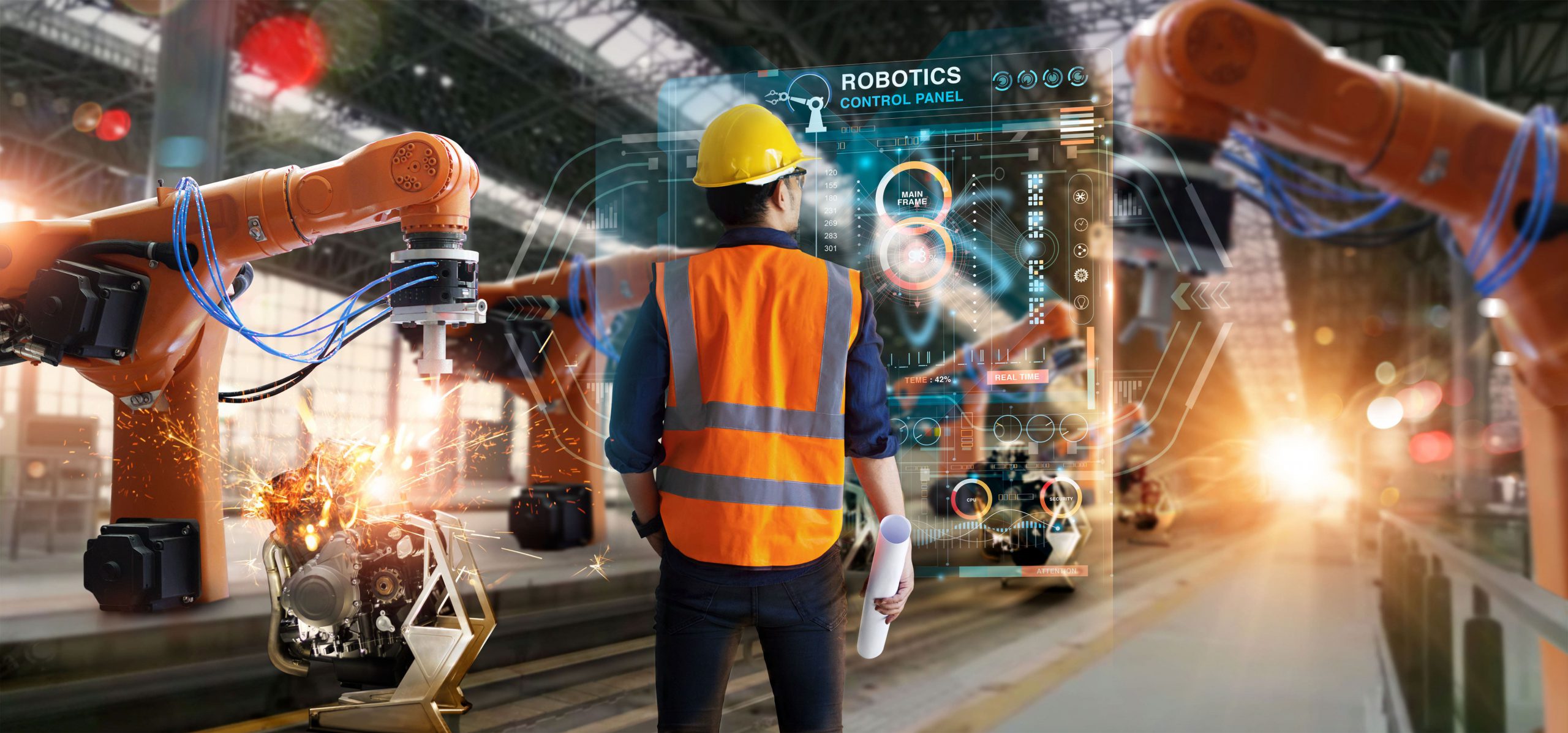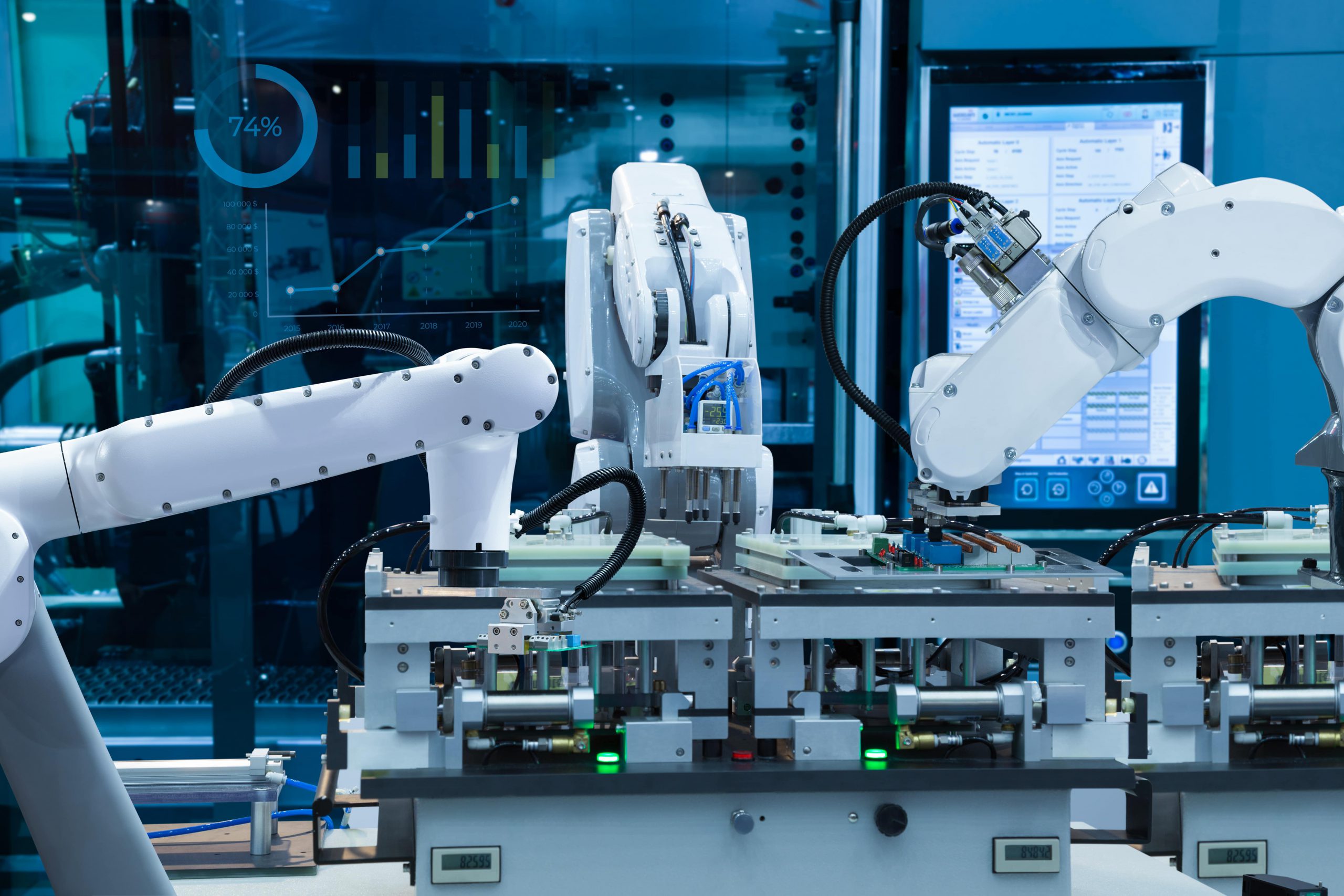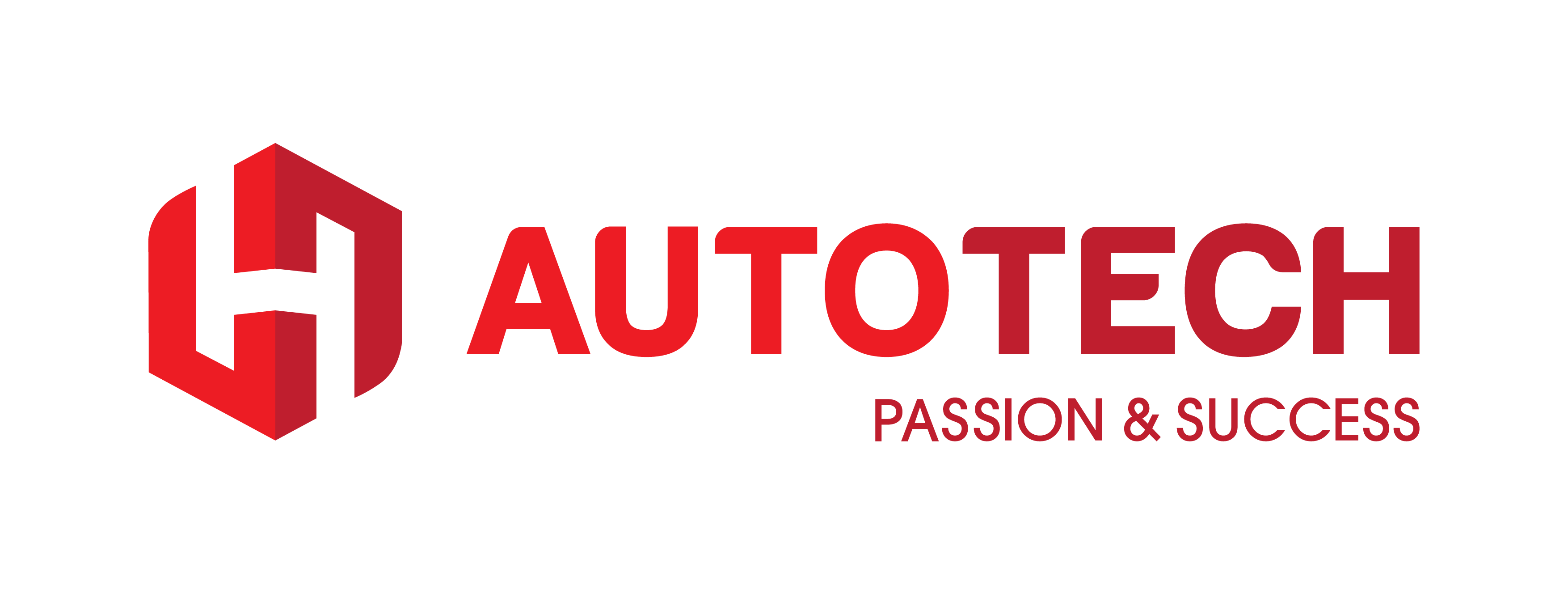In parallel with the strong development of automation, an industrial robot is being applied more and more popularly in manufacturing industries such as automobile, F&B, mechanical engineering, electronics, etc. The participation of industrial robots in production processes has helped businesses improve productivity and product quality, solve problems of labor shortage and labor safety, thereby bringing many positive changes to the economy as well as potential and development opportunities for new manufacturing industries.

Industrial robot: Potential opportunities for all manufacturing businesses
Industrial robot technology is growing rapidly and becoming popular with manufacturers around the world, especially developing markets in Asia, which tend to be more agile and flexible when it comes to making changes.

In Vietnam, although the robot market is not really open, due to many difficulties in investment capital and lack of highly qualified workers, many production lines in factories are still not automated, machines used are still old or just adopt information technology and use automation into certain lines. However, it is undeniable that the courage and efforts of many businesses in Vietnam are gradually moving to automation instead of the previously almost manual production activities, for example Vinamilk, read more about their story:- digital transformation in the field of F&B, etc. Currently, an industrial robot is penetrating more and more deeply into the production system and is applied in industries such as automobiles, electronics, animal feed, food and beverage, chemicals, mechanical engineering, etc.
Manufacturers have applied robot systems to smart manufacturing, resulting in improved productivity, safety and consistency in product quality, well as more flexibility in creating constantly changing product designs. Manufacturers in any industry, see the ability to simplify operations to reduce costs and increase efficiency and productivity, leading to improved revenue. It can be seen that an industrial robot opens up many golden opportunities for manufacturing enterprises in particular and the industry in general.
Benefits of industrial robot for Industry 4.0
The Industrial robot brings a lot of potential and development opportunities to the smart manufacturing industry in the future when not only helping factories improve efficiency but also helping to solve the problems of labor shortage and labor safety.

1. Better and more consistent quality assurance: Together with other technologies such as the Industrial Internet of Things (IIoT) or 3D printing robot, an industrial robot can assist or perform some processes in manufacturing, ensuring better product quality with accurate, reliable operation. Other benefits include reduced down time and real-time monitoring for improved performance, preventive maintenance.
2. Improve productivity: The robot’s ability to work is more durable than human labor, so when it has to complete many orders at the same time or when scaling up, Robot can work continuously according to the available programming of the employee to ensure the progress of the work, help achieve optimal production capacity, limit interruptions in the production process and ensure output product quality.
3. Improve working environment: Using an industrial robot for repetitive tasks, especially for heavy jobs or in hazardous environments, will also help reduce the risk of occupational accidents, help protect workers’ health and ensure compliance with labor safety rules in the factory. Moreover, the supervisor can operate the industrial robot remotely.
4. Solve the problem of shortage of workers: The Industrial robot can also solve the problem of lack of manpower in both quantity and quality. Manufacturers will no longer have to spend a lot of time recruiting new employees or implementing training routes for employees as before.
5. Reduce direct labor costs: The cost for a worker capable of multitasking, performing many production jobs often costs more, even more than using an industrial robot. This means that a robot has the potential to reduce direct labor costs, which can free up workers to put their skills and expertise to use in other business areas such as engineering, programming and maintenance.
6. Promote production and development of many industries: Some people argue that an industrial robot is taking jobs away from many workers but that is not really true. An Industrial robot is often integrated into a wide range of activities that require human expertise, helping to optimally allocate resources and promote economic development, thereby creating many new fields and jobs.
Applications of industrial robot in manufacturing industries
An Industrial robot has been widely applied in many processes and automated production lines, bringing benefits not only to businesses or factories but also to workers. Some applications of an industrial robot in manufacturing industries include:
1. Automobile manufacturing industry
An Industrial robot is driving new efficiencies across the industry, in applications including machine loading, inspection and assembly in powertrain, electronics and furniture manufacturing.
The automotive industry was one of the first to implement an automation solution for smart manufacturing processes. The entry of an industrial robot has been driving new efficiencies across the industry, in applications including material handling, picking, painting, welding, polishing, machine loading, inspection and assembly in the manufacture of powertrains, electronics and furniture, etc. In addition, robots can also be equipped with machine vision systems and AI systems that allow them to respond in a diverse and timely manner in the production system.

2. F&B industry
The F&B industry is an industry with specific requirements for food hygiene and safety, requiring production plants to be clean and sterilized. Therefore, limiting the presence of humans in the production plant is essential, instead, the application of closed automation lines and robotic arms is the first choice. The application of industrial robots in F&B production processes from processing, sorting, handling, stacking, picking and packing food has become an important part of increasing productivity, reducing costs and improving safe working environments in production processes.

3. Electronic component manufacturing industry
In the field of electronic components manufacturing is an area with special requirements such as high accuracy in locating, assembling and placing parts and the ability to handle gently to avoid microcracks or other potential physical damage to the product.
Therefore, the participation of an industrial robot in the field of electronic manufacturing is extremely important, necessary and inseparable. The use of industrial robot system in electronics and semiconductor manufacturing processes such as component fabrication, picking and placing, assembling miniature components on PCBs, applying adhesives, inspecting, testing testing, packaging, etc. have brought great benefits to businesses, helping to solve the problem of labor shortage, increase productivity, and preserve quality.

4. Logistics industry
One of the growing trends but little-known is the application of an industrial robot combined with artificial intelligence (AI) to the logistics industry for safer warehouse management and better control.
Due to the complexity of supply chain processes, robots will be increasingly used in processes such as ordering, shipping, warehousing, picking, packing, delivery, inventory, etc.

The involvement of an industrial robot system in the field of logistics helps distribution facilities or warehouse systems to streamline processes, increase accuracy, speed, cut costs and take care of all heavy work so that employees can fully focus on other productive tasks.
5. Pharmaceutical manufacturing industry
The pharmaceutical industry has had a lot of changes in recent times, especially with the emergence of the COVID-19 pandemic, the rapidly growing demand for pharmaceuticals forces manufacturers to adjust their production processes to keep up with customer demand.
Therefore, an industrial robot is one of the leading technologies used in their production processes to increase productivity and product quality, improve a safe working environment and effectively save operating costs.
Currently, industrial robots in the pharmaceutical industry are being applied in production processes such as dispensing, packaging, sorting, inspecting, capping medicine bottles, etc.
Collaborative robot: Leading the industrial robot trend?
Industry 4.0 paves the way for industrial automation and smart manufacturing towards smart factory development being supported by data-driven technologies such as IIoT, physical networks, wearable devices, AR, cloud computing, artificial intelligence (AI), big data, machine learning, etc. While industry 4.0’s sole focus is on improving process efficiency through physical and digital integration, it inadvertently ignores the importance of human value in process optimization.

The future Industry 5.0 trend will shift the focus to human value by combining the roles of mechanical and human components in production. This makes cobot the trend of industrial robot technology and the next wave of the industrial revolution. Using cobot to automate production, helps businesses increase their competitive advantage because their connectivity allows for many processes to be improved as well as to improve the safe working environment of the factory, and even provides valuable data analysis, including predictive analytics and recommendations on how to improve processes. A collaborative robot can enhance the work of employees and allow them to focus on more interesting and less dangerous tasks. At the same time, cobot helps support scalability and increase productivity, efficiency, and output.
Autotech Machinery JSC. - Vietnam's leading industrial automation solution provider
Autotech Manufacturing JSC. is a leading enterprise in Vietnam in industrial machine manufacturing as well as factory automation services including providing machine manufacturing products, improving and upgrading production line solutions, automation solutions (PLC services, industrial robots, vision machines, etc.).

With 2 offices in Bac Ninh and Ho Chi Minh City, we have been serving more than 100 large and small business customers across Vietnam such as Samsung, Vinfast, Mitsubishi, etc. and accompanies customers to successfully operate more than 3000 industrial automation projects including industrial robot operation solutions for many different industries and applications.

Coming to Autotech, we will help our customers improve flexibility, efficiency, safety and reliability, and work towards building the smart factory of the future.
Speak to Autotech Experts
Contact Autotech experts to get professional advice for your factory & business.
- Headquarters: No. 11-15, Street 17, Industry – Urban – Service Complex VSIP Bac Ninh, Dai Dong Commune, Tien Du District, Bac Ninh Province, 16000 Vietnam
- Ho Chi Minh City Branch: 49 Street No. 12, KP5 – Hiep Binh Chanh Ward – Thu Duc City – Ho Chi Minh City
- Hotline: (+84) 903 232 625
- Email: info@auto-tech.vn
Find out more about other products/services here: http://www.auto-tech.vn/home-new/en/san-pham/
Connect with us:
- Website: www.auto-tech.vn
- Linkedin: www.linkedin.com/company/autotechvn
